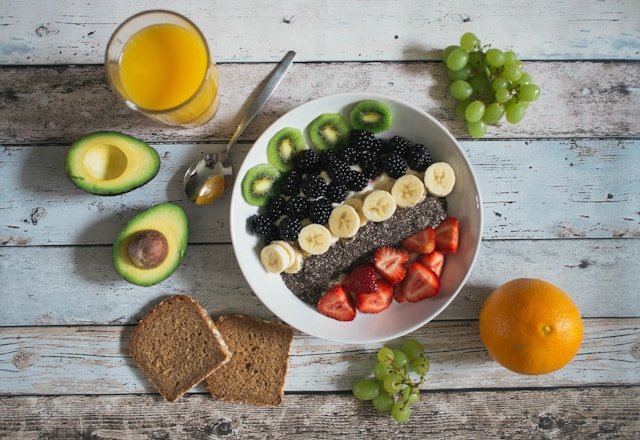
Fiber, frequently referred to as nature’s broom, plays a vital role in keeping us healthy. Yet, many remain unaware of its true benefits and how to seamlessly integrate it into their everyday lives.
Join me as we explore the fascinating world of fiber, uncover the best sources to include in our diets, and learn how this powerhouse nutrient can significantly enhance our wellbeing in unexpected ways.
Your Nutritional Unsung Hero
Fiber, also known as roughage or bulk, is a part of plant foods that our bodies cannot digest or absorb. Unlike other nutrients that are broken down and utilized, fiber travels through our digestive system mostly intact.
Understanding Soluble and Insoluble Fiber
Fiber acts as your digestive system’s best ally, ensuring everything runs smoothly while offering some surprising health benefits. However, not all fiber serves the same purpose!
There are two primary types: soluble and insoluble, each playing unique roles in our bodies. Let’s break them down.
Soluble Fiber – The Gel Buddy
Soluble fiber dissolves in water, creating a gel-like substance that slows digestion (in a good way!). It can be found in foods like oats, beans, apples, and citrus fruits.
Here’s how it benefits you:
- Promotes Healthy Weight – Slowing digestion helps you feel fuller longer, aiding in weight management.
- Lowers Cholesterol – It captures some dietary cholesterol, preventing it from entering the bloodstream.
- Stabilizes Blood Sugar – By slowing digestion, it helps maintain steadier blood sugar levels as carbohydrates are absorbed more gradually.
- Supports Heart Health – Lowering cholesterol and controlling blood sugar can significantly reduce heart disease risk.
- Nourishes Gut Bacteria – Certain types of soluble fiber serve as food for beneficial gut bacteria, helping them flourish and keeping your digestive system happy.
Insoluble Fiber – The Digestive Dynamo
Insoluble fiber does not dissolve in water; instead, it adds bulk to stool and promotes movement through the digestive tract. It’s abundant in whole wheat, bran, nuts, and vegetables like cauliflower and potatoes.
Here’s its importance:
- Prevents Constipation – It increases stool bulk and attracts water, facilitating easier passage through the digestive tract.
- Reduces Digestive Issues – It helps prevent conditions such as diverticular disease and hemorrhoids.
- Low in Calories – As your body doesn’t digest it, it fills you up without adding empty calories.
Key Takeaway – Striking a Balance
Both types of fiber are crucial for optimal health. Incorporating a variety of both ensures your digestive system functions well while also promoting heart health, weight management, and overall wellness.
So go ahead and load up on fiber-rich foods; your body will appreciate it!
Crafting Your Daily Fiber Routine
Establishing a daily fiber habit doesn’t have to be overwhelming; even small, simple changes can significantly enhance your health. Start your morning with a fiber-packed breakfast—think oatmeal topped with fruits or whole-grain cereal. Incorporate legumes, whole grains, and a variety of vegetables into your meals. Snacking on fruits, nuts, or seeds can also help you boost your intake.
As you increase your fiber consumption, do so gradually to minimize any digestive discomfort, and remember to drink plenty of water to aid its effectiveness.
When Diet Isn’t Enough, Consider Fiber Supplements
Even with our best efforts, meeting daily fiber recommendations can be challenging due to the prevalence of processed foods and busy lifestyles. This is where fiber supplements can help. Products like psyllium husk can assist in meeting increased fiber needs or dietary restrictions. These supplements are usually safe for daily use, but your body may require time to adjust.
To prevent digestive discomfort and enhance fiber’s benefits, gradually increase your intake and ensure you drink enough water.
If you take medications, it’s best to space out your fiber supplement intake—either two hours before or after taking your medications—since fiber can affect absorption. Supplements can typically be found in powder, pill, or gummy forms.
Always consult a healthcare professional before beginning any new supplement regimen to make sure it fits with your health requirements.
Addressing America’s Fiber Deficit
Despite FDA recommendations for daily fiber intake—25 grams for women and 38 grams for men—only about 5% of Americans meet these guidelines.
This shortfall, known as the “fiber gap,” can be linked to the high consumption of processed foods and a lack of whole, plant-based options in the typical American diet.
Closing this gap involves making thoughtful dietary choices, such as selecting whole grains over refined varieties, adding more fruits and vegetables to meals, and considering fiber supplements when necessary.
*Disclaimer: If you have any existing health conditions or are on medications, please consult with a healthcare provider before using psyllium.








